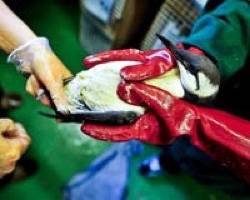
Wildlife conservation charities are calling for an urgent review of the marine hazard classification of the chemical (Polyisobutene) PIB.
Timed to coincide with the recent IMO MEPC meeting, leading wildlife conservation charities, animal welfare charities and the UK Chamber of Shipping, supported by the wider industry body MaritimeUK, came together as a single voice to call for an urgent review of the hazard classification status of (PIB).
The move follows two incidents off the UK coast that killed some 4,000 sea birds. Although not directly toxic to sea birds, polyisobutene becomes sticky when it comes into contact with seawater, coating the plumage of sea birds, restricting their movements and preventing them from feeding.
Currently, it is legal under MARPOL to discharge PIB in small quantities, based on certain conditions. However, the impacts of PIB on marine eco-systems, as well as the amount of PIB released routinely as part of legal shipping operations, are not well known or understood.




